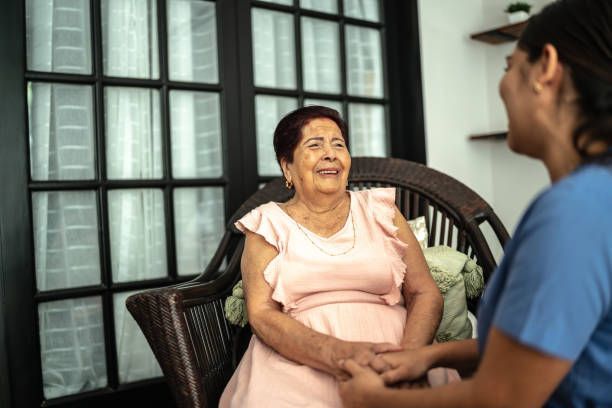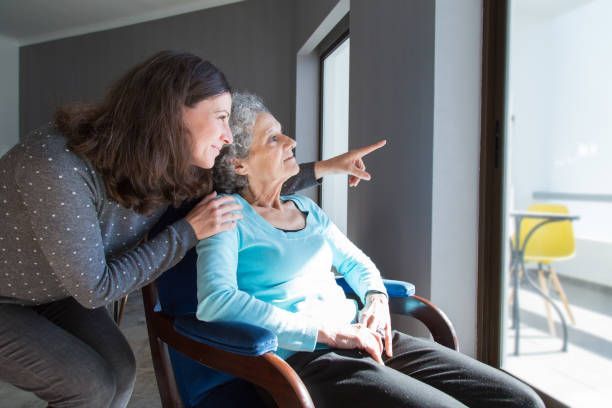7 Tips for Alzheimer’s and Dementia Care at Home: A Family Guide
7 Tips for Alzheimer's and Dementia Care at Home: A Family Guide
Caring for someone with Alzheimer’s disease, dementia, or any form of cognitive impairment at home is among the most demanding forms of caregiving due to the condition’s progressive nature, emotional complexity, and the constant need for vigilance. Unlike other medical conditions that may have clear treatment paths or predictable routines, cognitive decline affects every aspect of a person’s identity—memory, communication, behavior, and judgment—often changing day to day. At 7 Day Home Care, we understand that this kind of care requires not only physical assistance but also deep emotional patience, consistency, and specialized skills to manage wandering, sundowning, confusion, and challenging behaviors, all while preserving the person’s dignity and autonomy. The emotional toll on family caregivers can be immense, especially when a loved one no longer recognizes them or becomes increasingly withdrawn or aggressive. Our highly trained caregivers are equipped to meet these challenges with empathy and expertise, offering families the support they need to navigate one of life’s most complex caregiving journeys.
7 Day Home Care provides best home care agency services near you in Manhattan, Queens, Brooklyn, Nassau County, and Suffolk County, New York. To learn more about our specialized in-home care Home Health Aide services near you, please call 516-408-0034.

Alzheimer’s and Dementia Can Present the Most Challenging Conditions for Families at Home
Alzheimer’s and dementia are one of the most challenging conditions to manage at home. The progressive nature affects memory, cognition, behavior, and personality, often making daily routines overwhelming for both the individual and their family. At 7 Day Home Care, we understand the profound impact Alzheimer’s and dementia can have on a household. That’s why we’ve created this comprehensive guide to help families navigate the complexities of Alzheimer’s and dementia care at home with confidence, compassion, and the right resources.
Understanding Alzheimer’s and Dementia
Alzheimer’s disease and dementia are often used interchangeably, but they are not the same. Understanding the differences and how each condition affects the brain is essential for caregivers, families, and anyone supporting a loved one through memory loss.
What Is Dementia?
Dementia is not a specific disease—it’s an umbrella term used to describe a group of symptoms that affect memory, thinking, reasoning, and social abilities. These symptoms are severe enough to interfere with daily life and independence. Dementia is caused by damage to brain cells that disrupts their ability to communicate with each other, leading to changes in behavior, mood, and cognitive function.
There are many types of dementia, including:
- Alzheimer’s disease (the most common type)
- Vascular dementia
- Lewy body dementia
- Frontotemporal dementia
- Mixed dementia (a combination of two or more types)
Each form of dementia has distinct characteristics, but they often share overlapping symptoms, such as confusion, memory decline, and disorientation.
What Is Alzheimer’s Disease?
Alzheimer’s disease is a progressive neurological disorder and the leading cause of dementia. It is characterized by the buildup of abnormal protein deposits in the brain—amyloid plaques and tau tangles—which interfere with neuron function and eventually lead to cell death.
The disease typically develops slowly and worsens over time, beginning with mild memory lapses and eventually leading to severe cognitive impairment and loss of bodily functions. Alzheimer’s is irreversible, and while no cure currently exists, early intervention and supportive care can slow progression and improve quality of life.
Common Symptoms to Watch For Alzheimer's and Dementia
Recognizing the early warning signs of Alzheimer’s and dementia can lead to earlier diagnosis and better care planning. These may include:
- Memory loss that disrupts daily life
- Difficulty finding the right words or following conversations
- Misplacing objects or placing them in unusual places
- Confusion with time, place, or people
- Withdrawal from social or work activities
- Mood swings, irritability, or depression
- Poor judgment or decision-making
If a loved one is showing one or more of these signs, it is important to consult with a medical professional for a comprehensive evaluation.
Risk Factors and Causes of Alzheimer's
While the exact cause of Alzheimer’s remains unknown, researchers have identified several risk factors:
- Age: Risk increases significantly after age 65
- Genetics: Family history and specific genes like APOE-e4
- Lifestyle: Poor cardiovascular health, smoking, lack of exercise
- Head trauma: History of serious brain injury
- Cognitive inactivity: Limited mental stimulation over time
For other types of dementia, causes may include strokes (vascular dementia), Parkinson’s disease (Lewy body dementia), or infections and alcohol misuse (in rare cases).
Diagnosing Alzheimer’s and Dementia
There is no single test to diagnose Alzheimer’s or dementia. Physicians use a combination of tools, such as:
- Medical and family history review
- Cognitive and neuropsychological testing
- Brain imaging (MRI, CT, or PET scans)
- Blood tests to rule out other conditions
- Evaluation of symptoms and functional ability
Early diagnosis can give families time to plan for the future, explore treatment options, and make informed decisions about care.
Understanding Alzheimer’s and dementia is the first step toward compassionate, effective caregiving. These conditions affect millions of individuals and families around the world, but with knowledge, preparation, and support, it’s possible to maintain quality of life and preserve dignity for those affected. At 7 Day Home Care, we’re committed to guiding families through every stage of Alzheimer’s and dementia care with professionalism, empathy, and expertise.
The Emotional Toll on Families
Caring for a loved one with Alzheimer’s can be emotionally exhausting. Family caregivers often face:
- Feelings of guilt, anger, or helplessness
- Social isolation
- Strained relationships
- Burnout
Recognizing these emotional challenges is the first step toward managing them. Seeking support groups, therapy, and home care services can help caregivers maintain their well-being while continuing to provide loving care.
1. Creating a Safe Home Environment
Safety is one of the most critical aspects of Alzheimer’s care at home. As the disease progresses, the risk of accidents increases. Making strategic modifications around the home can prevent injuries and offer peace of mind.
Home safety tips include:
- Installing grab bars in bathrooms
- Removing throw rugs and clutter to prevent falls
- Using locks on cabinets that contain cleaning supplies or sharp objects
- Labeling rooms and drawers with large, easy-to-read signs
- Installing door alarms to prevent wandering
A safe environment reduces stress for both the patient and the caregiver, making daily life more manageable.
2. Establishing a Consistent Daily Routine
Routine is vital for individuals with Alzheimer’s. Predictability can reduce confusion, agitation, and anxiety. A well-structured day also helps caregivers stay organized and proactive.
Suggestions for a daily routine:
- Wake-up and bedtime at the same time each day
- Regular meal times
- Scheduled bathroom breaks
- Planned quiet time or naps
- Simple activities like walking, music, or puzzles
While it’s important to stick to a routine, caregivers should also remain flexible and adjust based on the individual’s mood and energy levels.
3. Communicating Effectively with a Loved One with Alzheimer’s
As Alzheimer’s progresses, communication becomes more difficult. Frustration can arise when words are forgotten, or thoughts are jumbled. Family members can ease communication by:
- Using simple sentences and a calm tone
- Making eye contact and smiling
- Avoiding arguments or correcting mistakes
- Asking one question at a time
- Using visual cues or gentle touch to guide behavior
Patience and empathy go a long way in maintaining connection and trust, even when words begin to fade.
4. Managing Difficult Behaviors
Behavioral changes such as aggression, paranoia, sundowning, or wandering are common in Alzheimer’s care. These symptoms are often the result of fear, confusion, or unmet needs.
Strategies to manage difficult behaviors include:
- Identifying triggers (hunger, fatigue, pain)
- Creating a calm and quiet atmosphere
- Distracting with a favorite activity or snack
- Avoiding confrontation
- Keeping a behavior log to discuss patterns with healthcare providers
When behaviors escalate or become unsafe, professional support is often necessary to reassess care strategies.
5. The Role of Nutrition and Medication
Proper nutrition supports brain health and physical strength, both of which are crucial for individuals with Alzheimer’s. A balanced diet can also help manage coexisting conditions such as diabetes or high blood pressure.
Nutrition tips:
- Offer small, frequent meals
- Encourage hydration with water, herbal teas, and soups
- Include brain-boosting foods such as leafy greens, berries, and lean proteins
- Reduce sugar and highly processed foods
In addition to nutrition, medication adherence is vital. Alzheimer's patients may be prescribed drugs to manage memory, mood, or sleep issues. Home caregivers must monitor for side effects and ensure timely administration.
6. Involving Professional Home Care Services
At some point, family caregivers may need additional help. Professional home care services provide relief, expertise, and consistency that are difficult to maintain alone.
Benefits of home care for Alzheimer’s patients:
- Personalized care plans
- Assistance with bathing, dressing, and meals
- Medication reminders and monitoring
- Companionship and cognitive stimulation
- Support with safety and mobility
7 Day Home Care’s certified home health aides receive Alzheimer’s-specific training to ensure compassionate, competent care. Our team works under the supervision of registered nurses and in close collaboration with families to create a nurturing home environment.
7. Caring for the Caregiver
It’s often said that you can’t pour from an empty cup. Caregivers must prioritize their own health and emotional well-being to continue providing quality care.
Tips for caregiver self-care:
- Take regular breaks, even short ones
- Join a support group (in-person or online)
- Maintain a healthy sleep and eating schedule
- Schedule personal time each week
- Seek respite care when needed
Burnout is real—and it’s okay to ask for help. At 7 Day Home Care, we believe supporting caregivers is just as important as supporting those with Alzheimer’s.
Why Choose 7 Day Home Care for Alzheimer’s Support
Caring for a loved one with Alzheimer’s is an evolving journey. Families need a partner they can trust—someone who understands the condition, offers flexible support, and provides care with empathy.
Here’s why families throughout New York choose 7 Day Home Care:
- Licensed by the New York State Department of Health
- Experienced caregivers trained in Alzheimer’s and dementia care
- Coverage across Manhattan, Brooklyn, Queens, and Long Island, New York
- Approved provider for your private long-term care insurance, and Catastrophe Major Medical, and NYSIF workers compensation cases
- 24/7 availability for live-in or hourly care
We are committed to delivering peace of mind, comfort, and dignity—every day, in every home. At 7 Day Home Care, we specialize in providing compassionate, professional in-home care for individuals living with Alzheimer’s disease and other forms of dementia. Our caregivers are trained to support not just the medical and physical needs of each client, but also their emotional well-being, independence, and dignity. Whether your loved one requires hourly assistance or 24-hour live-in care, we work closely with families to create personalized care plans that evolve with the progression of the condition. With services available across New York, including Manhattan, Brooklyn, Queens, and Long Island, 7 Day Home Care is here to bring comfort, stability, and peace of mind to every home we serve. 7 Day Home Care provides outstanding in-home Alzheimer's and dementia care services in Manhattan, Queens, Brooklyn, Nassau County, and Suffolk County, New York. To learn more about our specialized home care services near you, please call 516-408-0034 today.
Brian Callahan
7 Day Home Care










